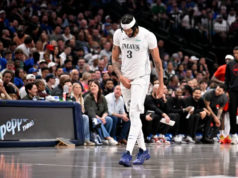TCU fandom hasn’t recently revolved around court sports. Fields tend to draw big crowds and the most recognition, at least in Panther City. Frog basketball took steps to change that perception this season with their NCAA tournament victory, which was preceded by men’s tennis capturing their first indoor national title. But a court filled with sand has become the newest launch pad for Horned Frog athletics hope.
The sand volleyball courts are nestled between Milton Daniel Hall and the campus recreation center. Previously, they were just where most millennial undergrads went to sweat Cuervo-and-cola leftovers from overzealous Thursday nights. In 2015, a new intercollegiate squad was birthed on campus. The team yielded logical success for an upstart fringe sport on a campus more than 300 miles from the nearest beach: They won zero games and didn’t play any home matches. The 2016 season was a stark contrast as the team played 25 matches, winning 18 of them, and concluded their season with a close win over 10th-ranked LSU. Since then, the burgeoning players have logged mostly winning seasons and have spiked themselves into the premier tier of this sandy sport.
The game itself is anything but young, but the standing with the NCAA is. TCU organized the team in response to the sponsorship of an official championship tournament, the first of which occurred in 2016. If you’re only familiar with indoor volleyball, beach is different. Each match consists of five 2-on-2 contests that occur simultaneously. The first team with three set-winning pairs wins the match. The strategy and makeup of the athletes also diverge from indoor volleyball. Beach players tend to be smaller and less specialized as they’re asked to cover half a court by themselves and be able to bump, set, and spike from everywhere. You’d probably be able to pick out three or four indoor players walking together around Target, where your average beach generalist might only be 5-foot-9 but a more adaptable overall athlete as they’re asked to be very good at many things, rather than excellent at only one or two.
TCU’s team has known only two coaches, and their current leader, Hector Gutierrez, has led the Frogs since 2017. Gutierrez lives and breathes volleyball. Originally from Spain and a retired professional player, he’s also married to a current professional. Previously an assistant with Florida State, Gutierrez guided the Frogs through 28 consecutive wins this season, including two against top-ranked UCLA, before their first loss against USC in Los Angeles. Their only other regular-season loss was at the hands of fourth-ranked Florida State in Tallahassee.
TCU’s 36-2 record garnered them the top seed in the Coastal Collegiate Sports Association conference tournament. The Frogs dispatched Tulane before avenging their earlier loss by beating the Seminoles. Sadly, FSU fought their way through the semifinals to rendezvous with the Beach Frogs in the finals, where the Sunshine Staters won their sixth-consecutive conference championship. TCU received a program record seven postseason awards from their conference, including coach of the year for Gutierrez. Their dominating win-loss record also earned them the second-overall seed in the NCAA tournament. Despite their stellar regular season, the Frogs were upset 3-2 by 10-seed Georgia State in their second match and relegated to the losers’ bracket, where they were upset again, 3-2 by sixth-seed LSU. Florida State and USC, who combined for three of the Frogs’ five total losses this season, met for the championship which top-seed USC won 3-1, to repeat as national champions. The Trojans have won four of the six total NCAA beach volleyball titles, and UCLA has won the other two.
TCU’s squad, which is primarily a trifecta of Texas, California, and Spanish talent, will have high expectations volleying forward. The young program is certainly one to watch as they attempt to cement themselves as a fixture in a sport that is new enough to root themselves as a legacy program, even though we’re lacking the natural geographic associations most would make when thinking about a prominent beach volleyball program, you know, like a nearby beach.
While most of us were busy trying to figure out how to avoid disappointing our wives and mothers this weekend, men’s tennis were making their mamas proud, per usual. The NCAA men’s tournament is in full swing, and the top-seeded Frogs get to hang around Fort Worth for the majority of it. Last week’s regional was reassuring, if uneventful, as David Roditi’s racketeers hammer-spanked Drake and Utah without dropping a match. This is the seventh-consecutive season the purple men have advanced to their Sweet Sixteen. Roditi has led his squad to the round of eight teams during the last two tournaments but is striving for a special season as they’ve not reached the semifinals since 2015. These court kings have already won one national championship this season, but the road ahead is uncharted. Roditi and company secured the Big 12 regular-season crown but lost a 2-4 match against Baylor during the conference tournament finals and are 1-2 against the Bears during the outdoor season.
Outdoor struggles aside, it would take a near-miracle upset to knock the Frogs out of their own super regional this coming weekend. Saturday’s opponent — NC State — is unseeded and scraped a 4-3 victory past 16-seed Middle Tennessee State. TCU’s quarterfinals opponent on Sunday will be the winner of Kentucky versus Wake Forest, the eight- and nine-seed, respectively. This squad is more than capable of meeting the tremendous expectations they’ve built and should be poised to advance to Roditi’s second final-four appearance (likely against Baylor, but possibly Tennessee) by the end of the weekend. These national champions have only lost versus three opponents this season, all of whom are ranked in the top-six seeds and spread across two of the other three super regionals.
Regardless of the team results, the NCAA tournament won’t be the end of the Frogs’ tennis season. The individual and doubles championships will immediately follow the team tournament in Florida, and TCU will send several seeded representatives, including the doubles pair of Luc Fomba and Jake Fearnley, who have recently received the ITA’s top ranking. Baseball and football certainly have their work ahead of them if they want to remain the most talked about programs on campus in the face of all the court successes of their fellow lettermen this year.












